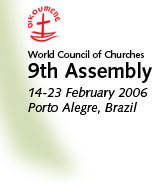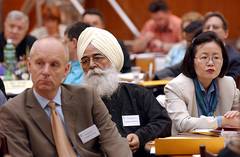 |
WCC > Home > News & media > Features | ||||
| About the assembly | Programme | Theme & issues | News & media | |||||
 |
|
||||
|
22.02.06
Talking about religions, doing faith
By Mark Woods (*)
More articles and free photos at
It was the theme of an address by the most senior dignitary of the Anglican Communion to the most representative body of Christians in the world. It is the subject of conversations in the corridors of power around the globe, where politicians have learned to talk of a clash of civilizations. With the publication of a few cartoons in a Danish newspaper, it has provided the context for an anguished debate in Europe and violent demonstrations throughout the world.
Inter-religious dialogue is now recognized as one of the most pressing needs of our time. In addition to the theological issues arising from the shrinking of the world and the ever more porous boundaries between communities, religion has become an increasingly significant component in inter-communal relations. Faith can make things better, or it can make them a great deal worse.
The archbishop of Canterbury addressed the question of Christian identity, seeking to ground it so firmly in the person of Jesus Christ that people of other religions would be seen neither as threats nor as targets. "The claim of Christian belief is not first and foremost that it offers the only accurate system of thought, as against all other competitors," he said.
"It is that, by standing in the place of Christ, it is possible to live in such intimacy with God that no fear or failure can ever break God's commitment to us, and to live in such a degree of mutual gift and understanding that no human conflict or division need bring us to uncontrollable violence and mutual damage."
He said as well that there were two "unhelpful" ways of approaching other faiths - either with an aggressive claim to exclusive possession of the truth, or with a loss of confidence leading to a view that every religion is as good as another. This analysis may strike a chord with many from Western countries, who have only recently been faced with the reality of religious pluralism.
But while Christians in the West are relative newcomers to these questions, Christians in some other parts of the world have been wrestling with them for years. Wesley Ariarajah is a mission and interfaith expert from Sri Lanka, and was part of an Ecumenical Conversation at the WCC 9th Assembly.
"No religious tradition is isolated any longer," he says. Whereas once mission organizations were confident that the faith they preached should be embraced by all people, "Today we are under pressure to live in mutual relationships. There is an irresistible plurality, a persistent plurality. Today, we are called upon to form our identity in relation to others."
This means rethinking the very way in which we hold our beliefs, he says. "What is the relation between dialogue and doctrine? Can we say 'We have the truth', then say that we want to be in dialogue to find the truth? Inter-faith dialogue has a future only if we re-own the fundamentals of our faith in a new way, in the context of plurality."
Does acknowledging plurality mean that evangelical Christians have to give up their desire to convert? Not according to the Most Revd Josiah Idowu-Fearon, archbishop of Kaduna Province in Nigeria and chair of the African Programme for Christian/Muslim relations.
"As Christians, we Africans left our traditional religions and embraced Christ - his uniqueness, his finality, and his claim that no-one could see God except through him," he says. "There is a serious problem because Africans are incurably religious, and we want to be faithful and honest to what we believe.
"The convert from an African traditional religion will not compromise. If Christ is the only way, and we have embraced him, how are we to take the Great Commission? We are obliged to win others to Christ," he affirms.
This does not mean, though, that all contact with Muslims, for instance, has to be theologically confrontational. Africans might be of different faiths, but there are other identities - of tribe or gender, for instance - which they share, and which provide a space for them to work together. Idowu-Fearon also chairs an NGO called Bridgebuilders of Nigeria, whose secretary is a fervent Muslim.
"We hold on to our absolutes; there are no grey areas," he says. "But there is no enmity between us. My witness to him is my life. How do I react in a crisis, when people are in need? We can find solutions to common problems. It's in my approach that I witness; I don't say, 'Repent or perish.'"
This demonstrates a way of inter-religious dialogue which is becoming increasingly influential. One of the problems with dialogue in the past, says Ariarajah, is that it has been conducted at a rarified level, between experts. "We have never found a way to integrate the dialogue of life with institutional dialogue," he says.
The dialogue of life - working together with those of other faiths in common causes, sharing experiences, festivals and friendships - is, he believes, essential. This is true not least because religions face many of the same problems - for instance, in the face of the "religion of Mammon" whose adherents "see life in terms of goods, power, getting pleasure fulfilled". This worldview, he says, is seeping into the church itself.
The loss of trust in institutions, too, affects all religions. "Many people are looking for a spirituality, but not where they used to," he says. "There is a very unformed new religious awareness. There is a search for meaning without belonging to an institution. This is a common problem in all religious traditions."
Another leading figure in inter-religious dialogue is the Orthodox archbishop Anastasios of Tirana, Durres and All Albania. For him, the "dialogue of life" is a key concept, particularly when, as often in the world today, Christians find themselves sometimes facing complex situations further aggravated by international tensions. There are, he says, different types of religious plurality. In some contexts, Christians are a majority, in others a minority, and in others numbers are equivalent. In all situations, he adds, secularism has a decisive role.
He is adamant that a syncretistic religion which abandons absolute truth claims is not acceptable. But, he says, "It is possible to overcome misunderstandings and misconceptions, and give to others the right to speak."
Sometimes, he finds, this means not talking about the theological issues at all. "When I went to Albania from Greece, the Orthodox were a minority," he said. "We discovered that to have co-existence, it was not possible to have theological dialogue. But there was a possibility of a dialogue of life, in which we respect one another and see what we can do together."
"A creative inter-religious dialogue can be developed in searching together for reliable answers to themes such as peace, justice, poverty, ethnic reconciliation and ecology."
This dialogue of life took on a sharp reality during the conflict in Kosovo a few years ago, when many Muslim refugees crossed into Albania.
"The first reaction of the Orthodox people was to be silent and pray," says Anastasios. "But then in the middle of this suffering, we saw what Christ said about the foreigner and the stranger. We made an appeal to our brothers and sisters in ecumenical bodies in Europe and throughout the world, and organized a system of relief. We collected $12m and organized support for 33,000 Muslim refugees."
"Young people and women left their own work to work in the camps. It was not just money, there was personal involvement. We did this without making a noise about it, but we did it."
For many theologians, the dialogue of life does not, in itself, resolve the hard theological questions which inevitably raise themselves. Has God revealed himself through other religions, and if so how, and to what extent? If the ultimate aim of Christians and Muslims, for example, is to convert each other, it is hard to see how there can be true encounter; but can Christians or Muslims ever say that they do not want to convert?
While these questions do not go away - and Anastasios is clear that specialists still have a role to play in providing "a new approach to old theological issues" - the encounters of ordinary believers of different faiths outside the academic debating hall provide a different context for them. Not everything needs to be on the table. "Many times, silence is an important part of dialogue," says Anastasios. "Silence in music belongs to the music, it is not outside the music."
For many Christians, the very idea of inter-religious dialogue is threatening, seeming to undermine what they hold dear. It need not, he says, be so, particularly when we enter such dialogue with a clear knowledge of who we are. "The encounter with the others presupposes, but also helps towards, deepening our Christian identity," he says.
He speaks of the title of one of the Assembly's Ecumenical Conversations, "Religious plurality is embraced and feared".
"If you embrace each other with love, you don't fear," he says. "To have this power to love, Christ is the only source, Christ and the Holy Spirit."
[1517 words]
(*) Mark Woods is a UK Baptist minister and editor of the Baptist Times.
Assembly website:www.wcc-assembly.info
Contact in Porto Alegre:+55 / 51 8419.2169
|
|||
|
|
|


